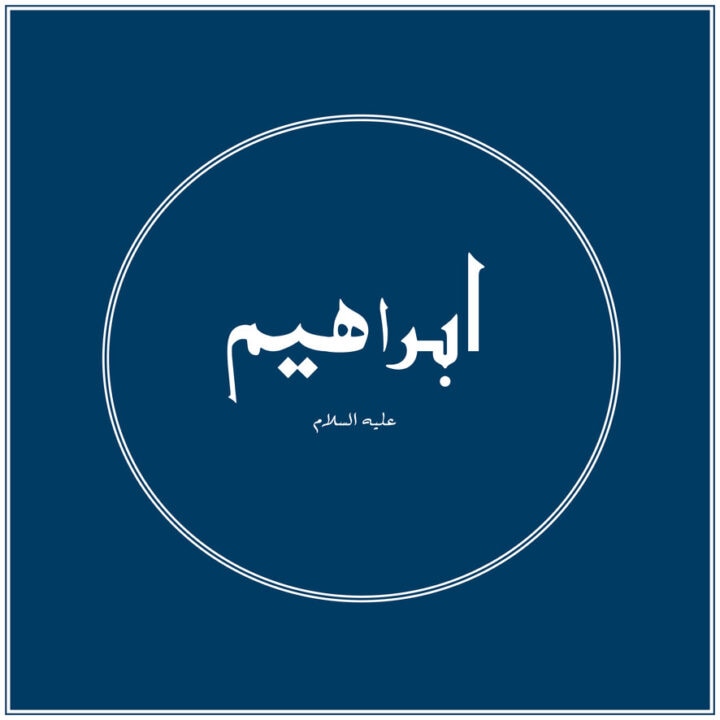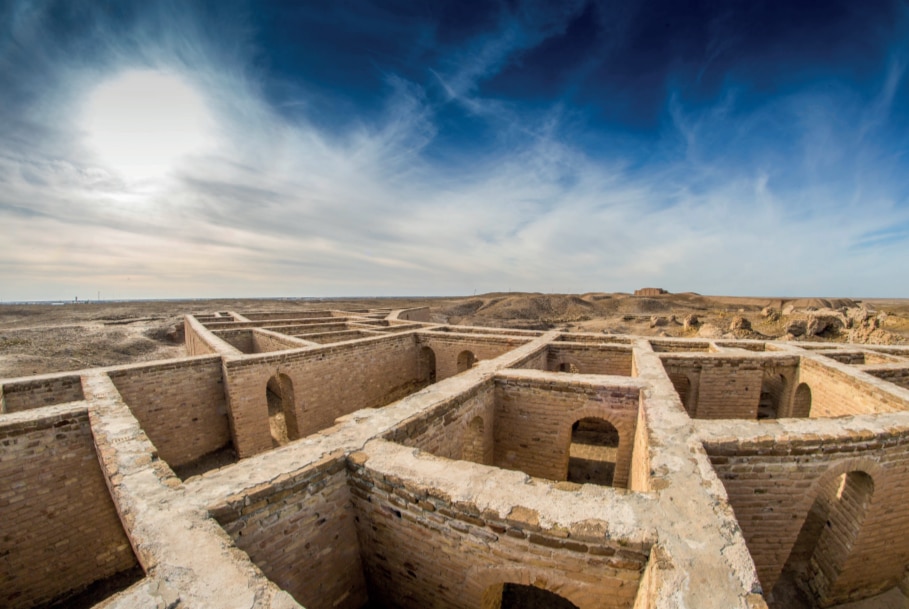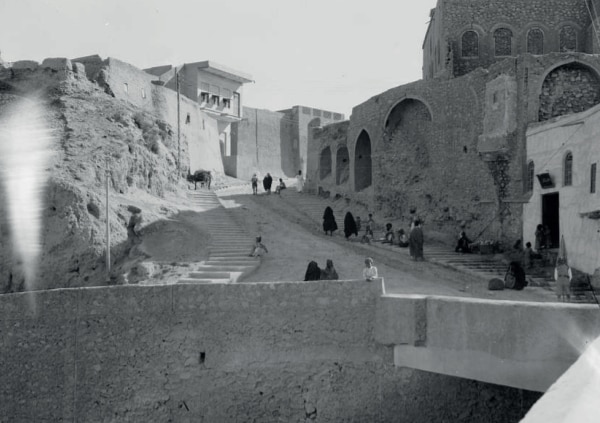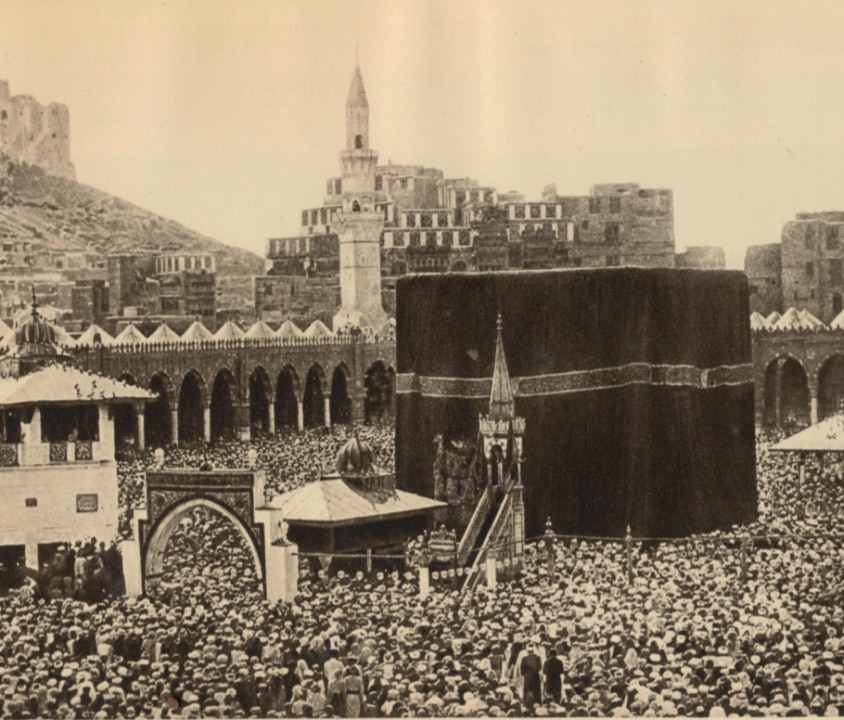Jalees Ahmad, Al Hakam
A short background of Hazrat Abrahamas

Hazrat Abraham – Ibrahim in Arabic – also known as Abul Anbiya (father of the Prophets), was a very noble and pious man and a prophet of Allah. His advent was approximately 2,700-2,800 years prior to the coming of Prophet Muhammadsa. He is accepted and revered by the three major religions of today – Muslims, Christians and Jews.
The Holy Quran, in Surah al-Saaffat, states that Hazrat Abrahamas was, in fact, a descendant of Hazrat Noahas:
وَ اِنَّ مِنۡ شِيۡعَتِهٖ لَاِبۡرٰهِيۡمَ
“And verily of his party was [also] Abraham”. (Surah al-Saaffat, Ch.37: V.84)
Hazrat Abrahamas was sent to a people who worshipped idols and stars. He resided in Iraq and during his life, travelled to Egypt. He married three times. The name of his first wife was Hazrat Sarah, who was a close relative; his second wife was Hazrat Hajirahas, who was an Egyptian and the name of his third was Hazrat Keturahas.
Prophet Abraham’sas eldest child, Hazrat Ishmaelas, was born through Hazrat Hajirahas, and Hazrat Isaacas was born through Hazrat Sarah. Both children of the Father of Prophets became recipients of Allah the Almighty’s immense blessings. The descendants of Hazrat Isaacas came to be known as Banu Israel, and the descendants of Hazrat Ishmaelas came to be known as Banu Isma‘il, among whom came the greatest man to walk the earth, the Holy Prophet of Islam, Muhammad, the chosen one, peace and blessings of Allah be upon him.
In a hadith of Sahih Muslim, the Holy Prophetsa is reported to have said:
“Indeed, Allah chose Kinanah from the children of Ishmael, and He chose Quraish from Kinanah, and He chose Hashim from Quraish, and He chose me from Banu Hashim.” (Jami‘ al-Tirmidhi, Kitab al-Munaqib an Rasulullahsa, Hadith 3606)
The truth of Prophet Abrahamas is found in the Holy Quran
In the Holy Quran, Allah the Almighty states:
وَ اذۡكُرۡ فِي الۡكِتٰبِ اِبۡرٰهِيۡمَ ۬ؕ اِنَّهٗ كَانَ صِدِّيۡقًا نَّبِيًّا
“And relate [the story of] Abraham [as mentioned] in the Book. He [was a]truthful[manand] a Prophet. (Surah Maryam, Ch.19: V.42)
In this verse, Allah has commanded the Holy Prophetsa to relate the story of Abrahamas asmentioned in the Holy Quran, as opposed to what is mentioned about him in the Bible. The Holy Quran clearly states that he was a truthful man, whereas the Bible accuses him of lying.
Did Prophet Abrahamas commit shirk?
A fallacy some people succumb to about Hazrat Abrahamas is that he committed shirk (associating partners with God) as a child. This misconception simply arises in the minds of people when they have not undergone a complete study of his life or a study of the Holy Quran.
The Holy Quran describes Hazrat Abrahamas as اُمَّةً meaning that he was a paragon of virtue and possessed a character of great quality; he is also described قَانِتًا meaning that he was always obedient to Allah. The Holy Quran further states, with regard to Hazrat Abrahamas, وَلَمۡ يَكُ مِنَ الۡمُشۡرِكِيۡنَ meaning that he was not of those who set up equals to God or committed shirk. To think that Prophet Abrahamas, Abul Anbiya, committed shirk, even as a child, is a thought a true Muslim can never entertain.
So, why has this misconception crept into the minds of others? In Surah al-An‘am, an incident from the life of Prophet Abrahamas has been recorded. Allah the Almighty states:
فَلَمَّا جَنَّ عَلَيۡهِ الَّيۡلُ رَاٰ كَوۡكَبًا ۚ قَالَ هٰذَا رَبِّيۡ ۚ فَلَمَّاۤ اَفَلَ قَالَ لَاۤ اُحِبُّ الۡاٰفِلِيۡنَ
فَلَمَّا رَاَ الۡقَمَرَ بَازِغًا قَالَ هٰذَا رَبِّيۡ ۚ فَلَمَّاۤ اَفَلَ قَالَ لَئِنۡ لَّمۡ يَهۡدِنِيۡ رَبِّيۡ لَاَكُوۡنَنَّ مِنَ الۡقَوۡمِ الضَّآلِّيۡنَ
فَلَمَّا رَاَ الشَّمۡسَ بَازِغَةً قَالَ هٰذَا رَبِّيۡ هٰذَاۤ اَكۡبَرُ ۚ فَلَمَّاۤ اَفَلَتۡ قَالَ يٰقَوۡمِ اِنِّيۡ بَرِيۡٓءٌ مِّمَّا تُشۡرِكُوۡنَ
“And when the night darkened upon him, he saw a star. He said: ‘This is my Lord!’ But when it set, he said: ‘I like not those that set.’ And when he saw the moon rise with spreading light, he said: ‘This is my Lord.’ But when it set, he said, ‘If my Lord guide me not, I shall surely be of the people who go astray.’ And when he saw the sun rise with spreading light, he said: ‘This is my Lord, this is the greatest.’ But when it set, he said, ‘O my people, surely I am clear of that which you associate [with God].’” (Surah al-An‘am, Ch.6: V.77-79)

Those who are not familiar with the practice of Hazrat Abrahamas and the wisdom he possessed, even as a child, might wrongfully interpret that Hazrat Abrahamas was committing shirk and took the evening star, the moon and the sun for God. However, this is, in fact, far from reality.
We must remember that Hazrat Abrahamas was sent to a people who worshipped stars and idols. The people would derive and associate all their pleasure and happiness from their false deities. Here, in this incident, Hazrat Abrahamas was, in fact, arguing and debating against star-worshippers and he adopted this method of debate to help them see that the things they had made and assumed to be their god could not help or avail them in any way.
With regard to these verses, Hazrat Musleh-e-Maudra stated:
“It is clearly written in this verse, ‘If my Lord guide me not, I shall surely be of the people who go astray.’ So, this verse refutes the idea of polytheism and proves that the word of Abrahamas was a form of sarcasm.” (Tafsir-e-Saghir, p.221)
Similarly, Hazrat Hakim Maulvi Nuruddin, Khalifatul Masih Ira – alluding to the words هٰذَا رَبِّيۡ which Prophet Abrahamas said – stated, “This served to indicate contempt.”
When Prophet Abrahamas saw the evening star disappear or set, he said, “I like not those that set”. Similar was the case with the moon and then the sun. Hazrat Abrahamas was trying to convey to his people that all which they assume to be their gods cannot avail them in any way. He then further goes on to say, “If my Lord guide me not, I shall surely be of the people who go astray.” This clearly shows that his faith in his Lord did not disappear and he was simply demonstrating the error of his people. He is already aware that those who take anything else as worship besides God are people who have lost guidance and who have gone “astray”.
Further to this, under these verses, in The Five-Volume Commentary of the Holy Quran, it is written:
“[…] if Abraham was really searching for God and had sincerely taken the star, the moon and the sun, in turn, for his Lord, then the conclusion at which he ought to have naturally arrived, after gradually rejecting the godhead of these three heavenly bodies, should have been that there was no God at all, but instead of declaring that there was no God, Abraham forthwith turned to his people saying: O my people, surely I am clear of that which you associate with God, I have turned my face toward Him Who created the heavens and the earth, being ever inclined to God. This shows that Abraham already knew the true God and believed in Him and was simply trying gradually to draw his people towards Him.” (The Five-Volume Commentary, Vol. 2, p. 887)
Prophet Abrahamas breaks the idols of his people
Hazrat Abrahamas was very much against the worshipping of idols. From a very young age, he understood that the idols his people worshipped were but mere sculptures and could not hear or accept any prayer. They were lifeless.
The Holy Quran highlights this fact and narrates an incident where Hazrat Abrahamas, who was young at the time, broke the idols in order to expose and demonstrate their weakness:
فَجَعَلَهُمۡ جُذٰذًا اِلَّا كَبِيۡرًا لَّهُمۡ لَعَلَّهُمۡ اِلَيۡهِ يَرۡجِعُوۡنَ
“So he broke them into pieces, [all] except the chief of them, that they might return to it for enquiry.” (Surah al-Anbiya, Ch.21: V.59)
Witnessing their idols broken into pieces, the people saidمَنۡ فَعَلَ هٰذَا بِاٰلِهَتِنَاۤ “Who has done this to our gods?” (Surah al-Anbiya, Ch.21: V.60)
Upon finding out Hazrat Abrahamas was behind this, they called him and asked him if he had broken the idols. In response, Prophet Abrahamas, exposing the weakness of their idols, said:
قَالَ بَلۡ فَعَلَهٗ ٭ۖ كَبِيۡرُهُمۡ هٰذَا فَسۡـَٔلُوۡهُمۡ اِنۡ كَانُوۡا يَنۡطِقُوۡنَ
“He replied, ‘Well, somebody has surely done this. Here is the chief of them. So ask [it and] them if they can speak.’” (Surah al-Anbiya, Ch.21: V.64)
Prophet Abraham’sas response served as a mighty blow and demonstrated to the people how weak and futile their gods were. Their gods were lifeless and could not even protect themselves and could not even speak. He highlighted their practices as being mere actions that did not benefit or profit them even in the slightest.
Hazrat Hakim Maulvi Nuruddin, Khalifatul Masih Ira, in Haqaiq al-Furqan, under the above-mentioned verse, wrote that Prophet Abrahamas adopted this method to draw the attention of his people towards their false, idolatrous ways.

Allah saves Hazrat Abrahamas and his people from the fire
After finding out Hazrat Abrahamas broke the idols, the idol worshippers, enraged and not being able to reply to his wisdom, decided to punish Hazrat Abrahamas. They said:
حَرِّقُوۡهُ وَانۡصُرُوۡۤا اٰلِهَتَكُمۡ
“Burn him and help your gods”. (Surah al-Anbiya, Ch.21: V.69)
Upon this, God’s help descended like rain from the Heavens. As they throw Prophet Abrahamas into the fire, God commanded:
يٰنَارُ كُوۡنِيۡ بَرۡدًا وَّ سَلٰمًا عَلٰۤي اِبۡرٰهِيۡمَ
“O fire, be thou cold and [a means of] safety for Abraham!” (Surah al-Anbiya, Ch. 21: V.70)
And thus, Prophet Abrahamas was saved, and the fire caused him no harm.
In Tafsir-e-Kabir, Hazrat Musleh-e-Maudra, shedding light on this verse, states:
“It seems that the fire was extinguished by some unseen material such as wind or rain. That is why Allah says, ‘O fire, cool down’. He does not say ‘O fire, do not burn.’” (Tafsir-e-Kabir, Vol. 5, p. 531)
Hazrat Abraham’s conversation with a king
We know through studying the history and life of prophets that they were all blessed with immense knowledge and wisdom from Allah the Almighty. Abul Anbiya is a prophet who is known for his profound knowledge and wisdom. Through history, we know that he was a resident of Iraq and a native of Ur of the Chaldees who was sent to a people who worshipped stars. Their chief god was the sun. Prophet Abrahamas was completely against this futile action of worshipping false deities and strongly preached against them.
In the Holy Quran we read an episode between Hazrat Abrahamas and the king of the time, Nimrod, who also laid claim to godhead.
When Prophet Abrahamas was brought before king Nimrod, he firmly said to the king that he could do him no harm as it was Allah who caused life and gave death. He said:
رَبِّيَ الَّذِيۡ يُحۡيٖ وَ يُمِيۡتُ
“My Lord is He Who gives life and causes death”. (Surah al-Baqarah, Ch.2: V.259)
Hearing this, Nimrod replied:
اَنَا اُحۡيٖ وَ اُمِيۡتُ
“I [also] give life and cause death.” (Surah al-Baqarah, Ch.2: V.259)
Upon this, in his profound wisdom, Prophet Abrahamas replied:
فَاِنَّ اللّٰهَ يَاۡتِيۡ بِالشَّمۡسِ مِنَ الۡمَشۡرِقِ فَاۡتِ بِهَا مِنَ الۡمَغۡرِبِ
“Well, Allah brings the sun from the East; bring it thou from the West.” (Surah al-Baqarah, Ch.2: V.259)
Hearing this, Nimrod was dumbfounded and silenced.
This confrontation highlights Prophet Abraham’sas courage, faith in God and profound wisdom.
Holy Prophet Muhammad’ssa love for Hazrat Abrahamas
It is a common practice that parents give their newborn child a name after a person who is close to their hearts, whom they love and respect.
We even see this practice done by the Holy Prophetsa. After marrying Hazrat Mariya Qibtiyara, the Holy Prophetsa had a son, who, though he passed away at a young age, he named Ibrahim.
On another occasion, a person came to the Holy Prophet Muhammadsa and said:
يَا خَيْرَ الْبَرِيَّةِ
Meaning, “O, the best of creation”.
Hearing this, the Holy Prophetsa replied:
ذَاكَ إِبْرَاهِيمُ عَلَيْهِ السَّلاَمُ
“That is Abraham, peace be upon him.” (Sahih Muslim, Kitab al-Fazail, Hadith 2369)
This hadith highlights the Holy Prophet’sas love and respect for Hazrat Abrahamas.
Indeed, we know that the Holy Prophetsa is, in fact, as stated by the Holy Quran, the best of mankind and “an excellent model”. For the Holy Prophetsa, who was the personification of perfection, to praise another person is something remarkable and noteworthy.
Misconception about Hazrat Abraham’s father
There is a misconception about who Prophet Abraham’sas father really was. Many Muslims are of the view that his father was Azar, who was known to be an idol-worshipper; however, this is not the case.
This misconception is derived from the following verse:
وَ اِذۡ قَالَ اِبۡرٰهِيۡمُ لِاَبِيۡهِ اٰزَرَ اَتَتَّخِذُ اَصۡنَامًا اٰلِهَةً
“And [remember the time] when Abraham said to his father, Azar: ‘Dost thou take idols for gods?’” (Surah al-An‘am, Ch. 6: V.75)
Quoting this, many Muslims hold the belief that Azar, who was an idol-worshipper, was the father of Prophet Abrahamas. Now, it is true the word اَبِيۡهِ has been used; however, the word اَب (father) can also mean an ancestor or paternal uncle.
Elsewhere, we read in the Holy Quran:
وَ مَا كَانَ اسۡتِغۡفَارُ اِبۡرٰهِيۡمَ لِاَبِيۡهِ اِلَّا عَنۡ مَّوۡعِدَةٍ وَّعَدَهَاۤ اِيَّاهُ ۚ فَلَمَّا تَبَيَّنَ لَهٗۤ اَنَّهٗ عَدُوٌّ لِّلّٰهِ تَبَرَّاَ مِنۡهُ ؕ اِنَّ اِبۡرٰهِيۡمَ لَاَوَّاهٌ حَلِيۡمٌ
“And Abraham’s asking forgiveness for his father was only because of a promise he had made to him, but when it became clear to him that he was an enemy to Allah, he dissociated himself from him. Surely, Abraham was most tender-hearted, [and] forbearing.” (Surah al-Taubah, Ch.9: V. 114)
In this verse, we see that Prophet Abrahamas made a promise to Azar, his اَب, that he would pray for his forgiveness; but when it became clear to Prophet Abrahamas that Azar was an enemy to Allah, he dissociated himself from him.
Following this, later on in his life, after the construction of the Holy Ka‘bah, Prophet Abrahamas prayed for his father; however, he did not say the word اَب, but said وَالِدَ:
رَبَّنَا اغۡفِرۡ لِيۡ وَ لِوَالِدَيَّ وَ لِلۡمُؤۡمِنِيۡنَ يَوۡمَ يَقُوۡمُ الۡحِسَابُ
“Our Lord, grant forgiveness to me and to my parents and to the believers on the day when the reckoning will take place.’” (Surah Ibrahim, Ch.14: V.42)
From this verse, we see that Prophet Abrahamas prayed for his father; however, in this prayer, he said وَالِدَ which means “the begetter”, which is used for the biological father.
This unmistakeably highlights that Azar, who has been called اَب, who Prophet Abrahamas “dissociated himself from”, was someone other than Prophet Abraham’sas actual father.
Abrahamas settles Ishmaelas and Hajirahas in the valley of Bakkah
When Ishmael was still young, Hazrat Sarahra asked Hazrat Abrahamas to settle Ishmael, and his other wife, Hazrat Hajirahas, elsewhere. This caused Hazrat Abrahamas a lot of grief; however, Allah commanded Hazrat Abrahamas to do as Hazrat Sarah had asked. The Bible states that God desired to make a nation from Hazrat Ishmael. Alluding to Prophet Abraham’sas son, Hazrat Ishmaelas, it is recorded in the Bible, “I will make a nation of him.” (Genesis 21:13)
Thus, according to Allah’s commandment, Hazrat Abrahamas took his son, Hazrat Ishmaelas, and Hazrat Hajirahas and settled them in the valley of Bakkah, which later came to be known as Makkah (Mecca).
As there was no water there, Hazrat Abrahamas placed a leather bag containing some dates and some water near Hazrat Ishmaelas and Hazrat Hajirahas. It is recorded in Sahih al-Bukhari that as Hazrat Abrahamas left, Hazrat Hajirahas said:
“’O Abraham! Where are you going, leaving us in this valley where there is no person whose company we may enjoy, nor is there anything?’ She repeated that to him many times, but he did not look back at her. Then she asked him, ‘Has Allah ordered you to do so?’ He said, ‘Yes.’ She said, ‘Then He will not neglect us.’” (Sahih Bukhari, Kitab Ahadith al-Anbiya, Hadith 3364)
Alluding to this incident, the Holy Quran records a prayer of Hazrat Abrahamas on this occasion. Hazrat Abrahamas faced the Ka‘bah and prayed:
رَبَّنَاۤ اِنِّيۡۤ اَسۡكَنۡتُ مِنۡ ذُرِّيَّتِيۡ بِوَادٍ غَيۡرِ ذِيۡ زَرۡعٍ عِنۡدَ بَيۡتِكَ الۡمُحَرَّمِ ۙ رَبَّنَا لِيُـقِيۡمُوا الصَّلٰوةَ فَاجۡعَلۡ اَفۡئِدَةً مِّنَ النَّاسِ تَهۡوِيۡۤ اِلَيۡهِمۡ وَارۡ زُقۡهُمۡ مِّنَ الثَّمَرٰتِ لَعَلَّهُمۡ يَشۡكُرُوۡنَ
“Our Lord, I have settled some of my children in an uncultivable valley near Thy Sacred House, – our Lord, – that they may observe Prayer. So make men’s hearts incline towards them and provide them with fruits, that they may be thankful.” (Surah Ibrahim, Ch.14: V.38)

The hadith further narrates that when the water Hazrat Abrahamas provided had been used up, Hazrat Hajirahas and her child became thirsty in the intense heat of Bakkah. Hazrat Hajirahas, not being able to bear seeing her child like this, started searching for water in agony. During her search for water, she mounted the mountain of Safa to see if she could sight anyone; however, she could not see anyone. She then dismounted and ran towards Marwa. She reached Marwa and stood on the mountain to see if she could see anyone. She repeated this seven times.
Alluding to this incident, the Holy Prophetsa said, “This is the source of the tradition of the walking of people between them” i.e. mounts Safa and Marwa, during Hajj.
Hazrat Abraham’s sacrifice
After settling Hazrat Ishmaelas and Hazrat Hajirahas in Bakkah, Hazrat Abrahamas would sometimes travel back and forth to meet them. When Hazrat Ishmael grew up to an age whereby he was able to work with his father, Hazrat Abrahamas saw in a dream that he was slaughtering his son. The Holy Quran narrates this instance in Surah al-Saaffat:
فَلَمَّا بَلَغَ مَعَهُ السَّعۡيَ قَالَ يٰبُنَيَّ اِنِّيۡۤ اَرٰي فِي الۡمَنَامِ اَنِّيۡۤ اَذۡبَحُكَ فَانۡظُرۡ مَاذَا تَرٰي ؕ قَالَ يٰۤاَبَتِ افۡعَلۡ مَا تُؤۡمَرُ ۫ سَتَجِدُنِيۡۤ اِنۡ شَآءَ اللّٰهُ مِنَ الصّٰبِرِيۡنَ
“And when he was old enough to work with him, he said, ‘O my dear son, I have seen in a dream that I am slaughtering thee. So consider, what thou thinkest [of it]!’ He replied, ‘O my father, do as thou art commanded; thou wilt find me, if Allah please, steadfast [in my faith].” (Surah al-Saaffat, Ch.37: V.103)
Thus, as Hazrat Abrahamas laid his son down and was about to commence in fulfilling the dream, an angel of Allah called to him and said:
قَدۡ صَدَّقۡتَ الرُّءۡيَا ۚ
“Thou hast indeed fulfilled the dream.” (Surah al-Saffat, Ch.37: V.106)
Hazrat Abrahamas was then commanded to release Hazrat Ishmael and sacrifice a ram in his stead.
Referring to this episode, The Five-Volume Commentary of the Holy Quran states:
“Abraham’s preparedness to sacrifice Ishmael was perpetuated in the Islamic institution of ‘Sacrifice’ which forms an integral part of the ceremonies of Hajj. As long as Islam lasts – and it shall last till the end of time – Pilgrimage to Mecca will continue to be performed and on the tenth day of Dhul-Hijjah goats and rams will continue to be slaughtered in hundreds of thousands in Mecca and all over the Muslim world in commemoration of Ishmael’s sacrifice. It is this institution of ‘Sacrifice’ that seems to have been referred to in this verse in the words ‘And We ransomed him with a great sacrifice’.” (The Five-Volume Commentary, Vol. 4, pp. 2699-2700)
Raising the foundations of the house of Allah
Many are of the opinion that Hazrat Abrahamas and Hazrat Ishmaelas were the first to build the Holy Ka‘bah. However, this is yet another misunderstanding.
The Holy Quran and the Holy Prophet Muhammadsa are very clear on this matter. Allah states in the Holy Quran:
وَ اِذۡ يَرۡفَعُ اِبۡرٰهٖمُ الۡقَوَاعِدَ مِنَ الۡبَيۡتِ وَ اِسۡمٰعِيۡلُ ؕ رَبَّنَا تَقَبَّلۡ مِنَّا ؕ اِنَّكَ اَنۡتَ السَّمِيۡعُ الۡعَلِيۡمُ
“And [remember the time] when Abraham and Ishmael raised the foundations of the House, [praying,] ‘Our Lord, accept [this] from us; for Thou art the All-Hearing, the All-Knowing.” (Surah al-Baqarah, Ch.2: V.128)
This verse highlights that Hazrat Abrahamas and Hazrat Ishmaelas raised the foundations of the Holy Ka‘bah and did not build it anew. The words الۡقَوَاعِدَ مِنَ الۡبَيۡتِ point to the fact that the foundations of the house existed prior to this incident.
Hazrat Musleh-e-Maudra, addressing this very matter, stated:
“Here, Allah the Almighty did not say يضع القواعد, but said يَرۡفَعُ القواعد. If there was a mention of laying the foundation, then the [root] word وضع would have been used. This shows that the House of Allah already existed, but its buildings had been destroyed. Hazrat Abraham, on whom be peace, under Allah the Almighty’s commandment raised its foundations.” (Tafsir-e-Kabir, Vol. 2, pp. 177-178)
Furthermore, it is narrated in Sahih al-Bukhari that when Hazrat Abrahamas settled Hazrat Ishmaelas and Hazrat Hajirahas in the valley of Bakkah, he made a prayer. Before praying, he raised his hands and “faced the Ka‘bah”. (Sahih al-Bukhari, Kitab Ahadith al-Anbiya, Hadith 3364)
“Raise up among them a Messenger from among themselves”
After raising the foundations of the Holy Ka‘bah, Hazrat Abrahamas prayed to Allah to raise a messenger who may recite God’s signs and purify people.
Abul Anbiya’s prayer is recorded in the Holy Quran:
رَبَّنَا وَ ابۡعَثۡ فِيۡهِمۡ رَسُوۡلًا مِّنۡهُمۡ يَتۡلُوۡا عَلَيۡهِمۡ اٰيٰتِكَ وَ يُعَلِّمُهُمُ الۡكِتٰبَ وَ الۡحِكۡمَةَ وَ يُزَكِّيۡهِمۡ ؕ اِنَّكَ اَنۡتَ الۡعَزِيۡزُ الۡحَكِيۡمُ
“And, our Lord, raise up among them a Messenger from among themselves, who may recite to them Thy Signs and teach them the Book and Wisdom and may purify them; surely, Thou art the Mighty, the Wise.’” (Surah al-Baqarah, Ch.2: V.130)
Hazrat Musleh-e-Maudra, in relation to this verse, writes in Tafsir-e-Kabir that though Hazrat Abrahamas was promised that his progeny would be blessed and that many prophets would be raised, he still prayed for “a Messenger” to be raised from the progeny of Hazrat Ishmaelas. He did not say رُسُلًا (messengers) but he said رَسُوۡلًا (a messenger). This heartfelt prayer was fulfilled with the advent of the Holy Prophet Muhammadsa, who recited God’s signs, taught the Book and wisdom and purified the world.
As we approach the blessed days of Hajj and Eid-ul-Adha, let us remember the sacrifice and life of Hazrat Abrahamas.
Indeed, through the Holy Quran, we can learn about the lives and examples of the previous prophets who were blessed by God. Let us continue to reflect on their examples and become true followers of the Holy Prophet Muhammadsa.
اللّٰهُمَّ صَلِّ عَلَى مُحَمَّدٍ وَعَلَى آلِ مُحَمَّدٍ كَمَا صَلَّيْتَ عَلَى إِبْرَاهِيمَ وَعَلَى آلِ إِبْرَاهِيمَ إِنَّكَ حَمِيْدٌ مَجِيْدٌ
اللّٰهُمَّ بَارِكْ عَلَى مُحَمَّدٍ وَعَلَى آلِ مُحَمَّدٍ كَمَا بَارَكْتَ عَلَى إِبْرَاهِيمَ وَعَلَى آلِ إِبْرَاهِيمَ إِنَّكَ حَمِيْدٌ مَجِيدٌ


MashaAllah, very good compiling of the incidents , more articles should be written about other prophets as well to raise awareness amongst the youth about life and characters of Allah’s prophets , or making documentaries would be of more significance.
Maa’shaAllah, these are soul-inspiring.